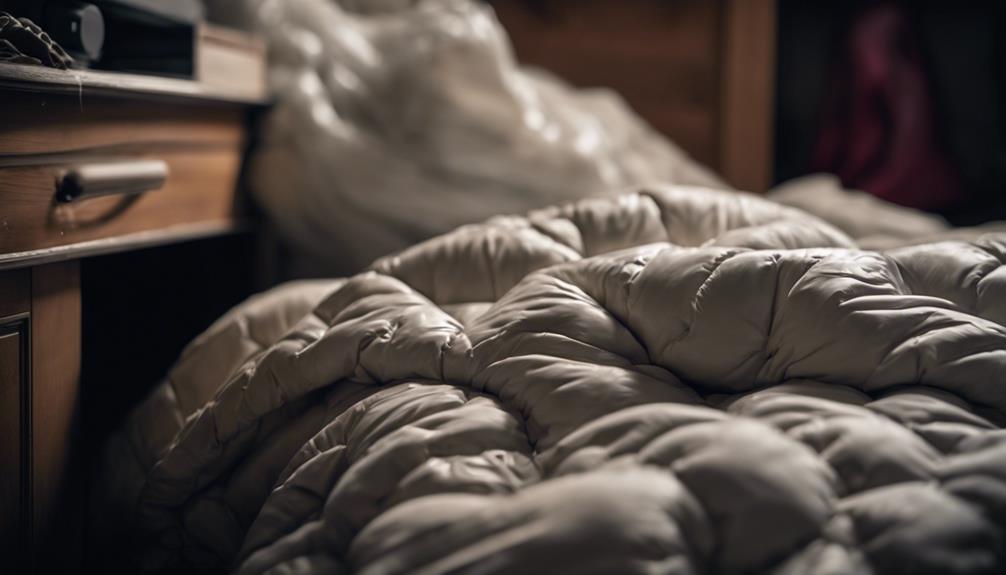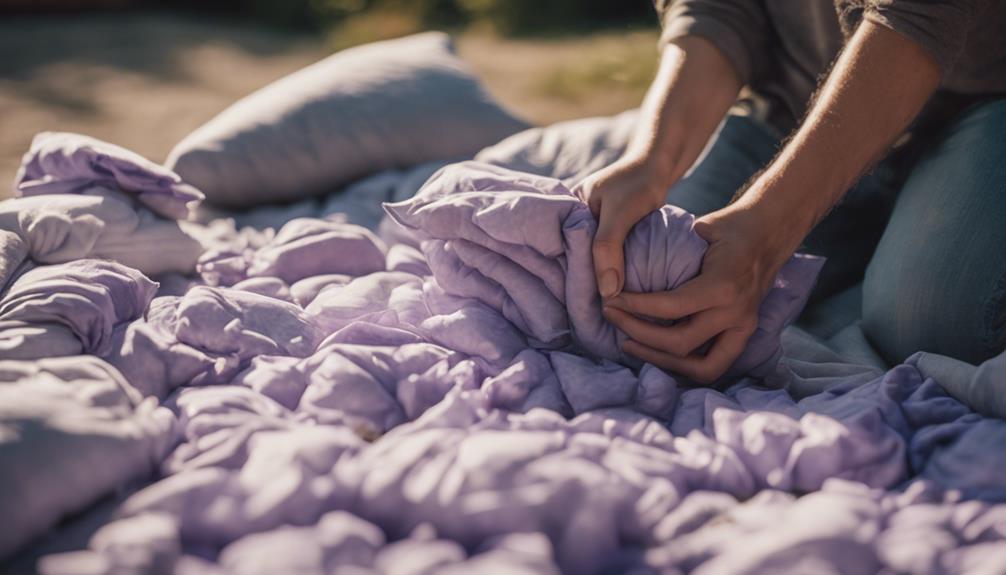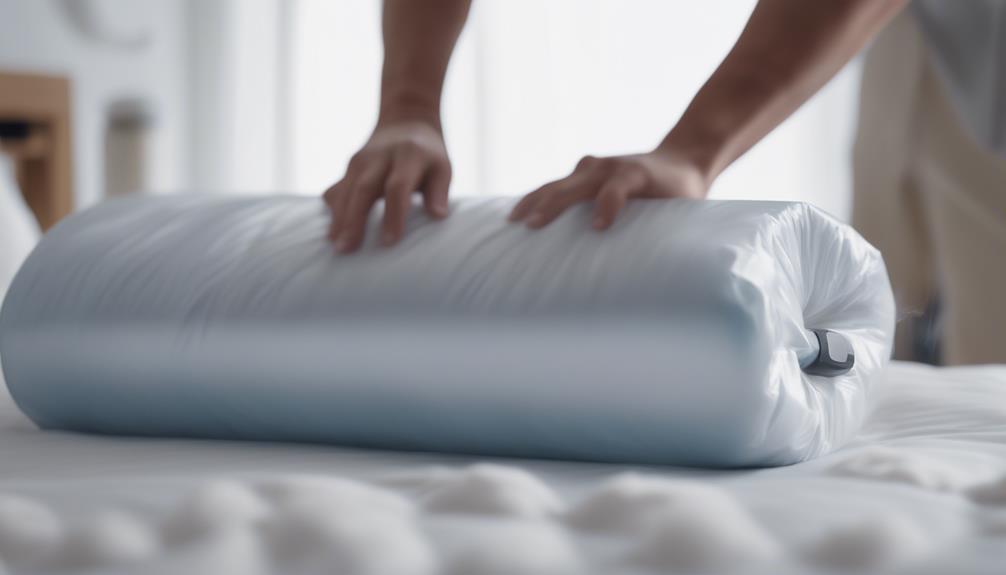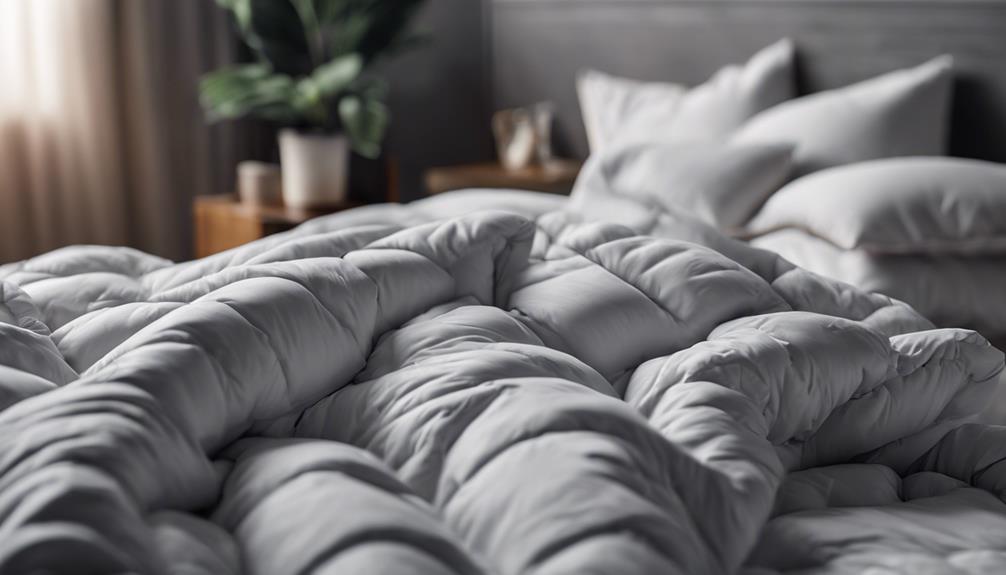Moisture retention and insufficient drying techniques can lead to that unpleasant smell in your down comforter. When moisture lingers, fungus thrives, causing the comforter to smell musty. Even the manufacturing process can contribute, with chemicals used adding to the odor. Adequate care is crucial; exposure to outdoor sun, washing with vinegar, and thorough drying can help eliminate odors. To prevent smells, consider using duvet covers and proper storage. By following care instructions and maintenance tips, you can ensure a fresh, odor-free down comforter. More information on causes, effects, and solutions can be found in the detailed research provided.
Key Takeaways
- Moisture retention in down comforters leads to unpleasant smells.
- Chemicals used in manufacturing contribute to initial odors.
- Improper storage in plastic or humid environments causes musty smells.
- Thorough drying, washing with vinegar, and sun exposure eliminate odors.
- Utilizing duvet covers and proper care prevent future smells.
Causes of Down Comforter Smell
Moisture retention in down comforters often leads to the development of unpleasant smells. When humidity gets trapped in the comforter, it creates an ideal environment for fungus growth, resulting in a musty smell. Neglecting proper drying techniques can lead to a moldy odor that resembles wet dog. Fungus spores thrive in these humid conditions, producing strong and unpleasant odors within the comforter. To prevent long-term damage and these unpleasant smells, it's important to address the moisture issue and make certain thorough drying of the down comforter.
Proper drying techniques are essential in preventing the growth of fungus and the development of musty or moldy smells. By making sure the comforter is completely dry, you can avoid the accumulation of moisture that fosters unpleasant odors. Taking the time to dry the comforter correctly can go a long way in maintaining its freshness and preventing any potential damage caused by humidity and fungus growth.
Impact of Manufacturing Processes

During the manufacturing process, the use of certain chemicals can contribute to the development of odors in down comforters. The type of chemicals, along with the treatments applied to the bedding materials, can impact the intensity of the odor in new comforters.
If comforters are stored for a prolonged period in plastic packaging, they may retain chemical odors more strongly. To minimize initial smells, choosing bedding materials with fewer chemicals, such as natural latex instead of memory foam, can be beneficial. Opting for organic bedding materials like wool, cotton, bamboo, or Tencel can also result in less chemical odor in comforters.
Hence, the manufacturing processes and materials used play a significant role in determining the level of odor present in down comforters. By being mindful of the chemicals and treatments involved in the production of bedding, one can make an informed choice to reduce unwanted smells in their sleeping environment.
Effects of Storage Conditions

Given the importance of manufacturing processes on the odor of down comforters, it's essential to also investigate the effects of storage conditions on preserving the freshness of these bedding items.
Storing down comforters in plastic can trap moisture, leading to musty odors. Humid environments pose a risk, causing mildew smells during storage. To prevent these issues, proper ventilation and breathable storage bags are recommended.
Long-term storage in damp or closed spaces can result in a musty smell developing in down comforters. It's critical to avoid storing down comforters in areas prone to moisture accumulation to prevent odors.
Methods to Eliminate Odors

To effectively eliminate odors from down comforters, hanging the comforter outdoors in the sun is a highly recommended method. This natural approach helps freshen the comforter and make the smell go away.
Additionally, washing down comforters with white vinegar and mild detergent in a delicate setting can effectively remove odors. Air drying the comforter outside guarantees thorough drying and freshness. Proper care, such as using a comforter cover, can help prevent odors from lingering. For hypoallergenic comforters, this method is gentle yet efficient.
Remember to remove excess water before drying to avoid any musty smells. By following these steps, your down comforter will be clean, fresh, and free of any unwanted odors.
Prevention Tips for Future Smells

To prevent future smells in down comforters, utilizing duvet covers is essential to protect them from odors and prolong their longevity. Duvet covers act as a barrier, preventing the absorption of odors and keeping the comforter fresh. Additionally, following care instructions for washing and drying the comforter is vital in maintaining its cleanliness. Here are some prevention tips for future smells in down comforters:
| Proper Cleaning | Description |
|---|---|
| Dry cleaning | Follow care instructions or take it to a professional. |
| Washing | Use mild detergent and wash according to guidelines. |
| Drying process | Air dry or use a large capacity dryer to fluff it up. |
Regularly fluffing the comforter can help maintain its fluffy texture and prevent odors from settling in. Consider storing the comforter in a breathable cotton bag to avoid trapping odors and moisture when not in use. Remember, proper care and maintenance are key to enjoying a fresh and odor-free down comforter for years to come.
Frequently Asked Questions
How Do You Get the Smell Out of a Down Comforter?
To get the smell out of a down comforter, we recommend airing it outside in the sun, washing it with warm water, white vinegar, and mild detergent, then air drying it.
Adding tennis balls or sneakers in the dryer during the final dry cycle can help fluff the comforter and remove any remaining odors effectively.
Fragrance sprays can also temporarily mask unpleasant smells, especially when covered with a duvet.
How to Stop Feather Duvet From Smelling?
To prevent a feather duvet from smelling, make sure it's fully dry before storage to avoid musty odors.
Wash with fungicide to combat smells and kill fungal spores.
Store in breathable cotton bags, not plastic, to prevent moisture buildup.
For professional care, consider services like Farthings Cambridge and Trumpington for cleaning and odor removal.
Proactive steps like these can help maintain a fresh-smelling down comforter.
How to Get Rid of Goose Down Smell?
To get rid of goose down smell, washing the comforter with vinegar and mild detergent helps eliminate the odor. Hanging it outside in the sun for air drying can further aid in removing the smell.
Using fragrance sprays temporarily masks the odor, but washing is recommended for thorough removal. Storing the clean comforter in a breathable cotton bag prevents the return of the goose down smell.
Why Does My Goose Down Duvet Smell?
We find that goose down duvets can develop a musty smell due to moisture retention and inadequate drying. Fungal growth from trapped moisture can cause a wet dog-like odor. Neglecting proper drying methods may lead to long-term unpleasant odors in goose down duvets.
Adding a fungicide during washing can help eliminate fungal spores and prevent odors. Storing duvets in breathable cotton bags can deter fungal growth and maintain freshness.
Is the Smell of a Down Comforter Related to It Becoming Stiff After Washing?
After washing a down comforter, the smell may linger due to improper drying. But a stiff comforter after washing is often a result of insufficient rinsing or excessive heat during the drying process. To maintain its fluffiness, it’s crucial to follow the care instructions carefully.
Conclusion
To sum up, properly caring for your down comforter can help prevent unpleasant odors from developing.
By understanding the causes of the smell, the impact of manufacturing processes, and the effects of storage conditions, you can effectively eliminate odors and keep your bedding fresh.
Remember to regularly clean and store your comforter in a well-ventilated area to maintain its quality and guarantee a cozy night's sleep.









